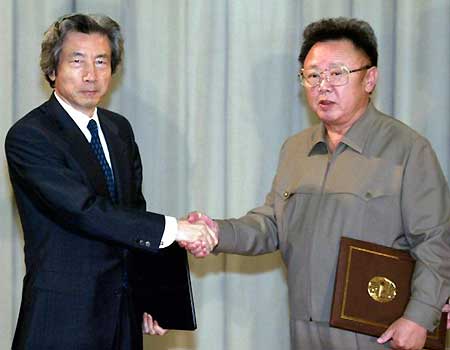Nevertheless, the story quickly shifted from Japan’s abductees to more pressing security issues. Most Japanese news reports and commentary on this issue have displayed far greater concern about what the Clinton visit signalled to North Korea, and whether Japan had been consulted by the US prior to Clinton’s visit (it had). Japan’s Yomiuri Shinbun released a stern editorial a day after the visit, demanding that the US closely consult with Japan and South Korea on all North Korean issues, and warning that North Korea would continue to provoke the international community with further nuclear and missile tests. The conservative Sankei echoed Henry Kissinger’s criticism that Clinton’s visit to North Korea undeservedly rewarded the rogue North Korean regime. Sankei also reported that the families of Japanese citizens abducted by Pyongyang were concerned that Clinton’s visit had further derailed the six-party talks.
Yet Clinton’s visit was only the start of a difficult month for Japan regarding North Korea. As North and South Korea entered the most cooperative period in their relationship since the election of the conservative Lee government, the Japanese press remained wary. The Yomiuri Shinbun’s August 26 editorial was sceptical of North Korea’s ‘real intentions’ in resuming talks with the South, and urged the international community to maintain pressure on North Korea to abandon its nuclear program. An editorial in the Asahi Shinbun was even more blatant in arguing that despite a few positive diplomatic steps, North Korea ‘should be criticised’ for making no effort to abandon its nuclear weapons program. Asahi also demanded closer consensus between the US, South Korea and Japan on whether or not the ‘basic situation’ on North Korean had changed.
What does all this mean for Japanese policy towards North Korea, the US and the six-party talks? Four significant issues have arisen out of the August developments in North Korea.
First, North Korea’s ‘charm offensive’ has been influential in Japan’s recent general election. Tobias Harris at Observing Japan has noted that Aso began his national campaign tour at the site where the youngest Japanese victim, Yokota Megumi, was kidnapped in 1977, and that Aso attempted to use the abduction issue to paint the LDP as the safe choice on national security. Ultimately, however, the scare-mongering campaign backfired for the LDP. If anything, the visits by Bill Clinton and Hyun Jung-eun to North Korea simply highlighted the inadequacy of the last three LDP Prime Ministers (Koizumi was the last Japanese leader to travel to North Korea in 2004) in making progress on the abduction issue. Furthermore, any political capital sought by the LDP was eroded when DPJ leader and newly elected Prime Minister, Hatoyama Yukio, announced during the campaign that the DPJ would maintain Tokyo’s tough stance on the abduction issue within the six-party framework.
Second, these developments demonstrated that Japan remains in a uniquely difficult position when it comes to North Korea. Pyongyang sent conciliatory signals to South Korea and the United States during August, but did not offer the same goodwill towards Japan. Indeed, North Korea made the calculated move of releasing a South Korean detainee and agreeing to resume talks with South Korea before August 15 – the date both Koreas celebrate liberation from Japanese colonial rule. This step indicated that despite the ‘charm offensive’, Japan was unlikely to receive any special favours from North Korea.
Third, since the ‘shock’ of Clinton’s visit to Pyongyang, the Obama administration has worked hard to avoid being tagged with ‘Japan-passing’. Recent high-level US statements on Japan have featured prominent language about collaborating with the Japanese government to resolve the North Korean nuclear issue. Two particular examples are reports on the first meeting between John Roos, new US Ambassador to Japan, and former Prime Minister Aso, and the State Department’s official response to the Japanese election. In addition, daily State Department briefings throughout August have taken care not to sound overly enthusiastic about North Korea’s recent conciliatory behaviour, presumably for fear of upsetting Japan, and have consistently reiterated that the US does not wish to ‘disenfranchise’ or ‘disconnect’ its regional partners in dealing with the North Korean nuclear issue. Reaching out to the new DPJ government on the North Korean issue will be crucial for the Obama administration, particularly given Hatoyama’s call for a ‘more equal alliance’ with the United States.
Yet the fourth and final issue is that the US and the DPJ may be moving in different directions on North Korea. So far, the DPJ has appeared extremely confident about the future of the six-party talks and Japan’s place within them. Nagashima Akihisa, deputy secretary-general of the DPJ, recently stated that:
‘For the six-party talks, which seek the abandonment of the North’s nuclear weapons (program), to move forward, ultimately aid from Japan will be needed…If you look at a snapshot in time, it may appear as if Japan is being left behind, but ultimately, without Japanese aid, the deal will not be clinched.’
Nevertheless, the Obama administration might not resist Pyongyang’s charms forever, and the US has already agreed to hold bilateral talks with North Korea. As an administration that has advocated talking with hostile states such as Iran and North Korea, it has and will continue to be difficult for the Obama administration to ignore North Korea’s conciliatory behaviour. Despite the State Department’s exhortations that the August developments have changed nothing on the North Korean issue, the DPJ is likely to be pushed into an uncomfortable position on North Korea. Hatoyama will have to work hard to ensure that Japan’s voice is heard.
Amy King is a doctoral student working on Sino-Japanese relations at Oxford University.

